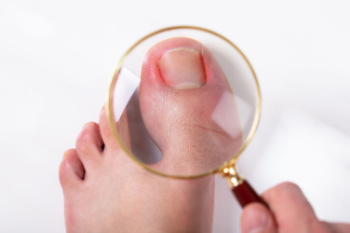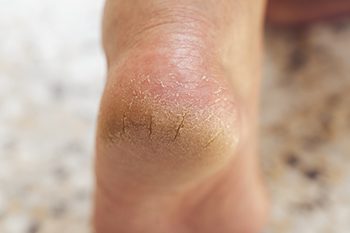
Ingrown toenails develop when the edges or corners of a toenail grow into the surrounding skin, causing pain, redness, and swelling. The condition can happen on either the side, tip or even the base of the toenail. Common causes include improper nail trimming, tight shoes, or injury to the toe. In some cases, genetics or fungal infections can contribute to the development of ingrown toenails. Symptoms include localized pain, swelling, and sometimes pus or drainage if an infection sets in. The affected toe may appear red or tender, and pressure from shoes can increase the pain. Left untreated, ingrown toenails can lead to more serious complications, such as infection or permanent nail damage. A podiatrist can provide effective treatments for ingrown toenails, including trimming or removing the nail, draining any infection, and prescribing antibiotics if necessary. In chronic cases, they may perform a minor procedure to prevent the nail from growing back incorrectly. If you are dealing with an ingrown toenail, it is suggested that you make an appointment with a podiatrist for care.
Ingrown toenails can become painful if they are not treated properly. For more information about ingrown toenails, contact one of our podiatrists of Springfield Podiatry Associates. Our doctors can provide the care you need to keep you pain-free and on your feet.
Ingrown Toenails
Ingrown toenails occur when a toenail grows sideways into the bed of the nail, causing pain, swelling, and possibly infection.
Causes
- Bacterial infections
- Improper nail cutting such as cutting it too short or not straight across
- Trauma to the toe, such as stubbing, which causes the nail to grow back irregularly
- Ill-fitting shoes that bunch the toes too close together
- Genetic predisposition
Prevention
Because ingrown toenails are not something found outside of shoe-wearing cultures, going barefoot as often as possible will decrease the likeliness of developing ingrown toenails. Wearing proper fitting shoes and using proper cutting techniques will also help decrease your risk of developing ingrown toenails.
Treatment
Ingrown toenails are a very treatable foot condition. In minor cases, soaking the affected area in salt or antibacterial soaps will not only help with the ingrown nail itself, but also help prevent any infections from occurring. In more severe cases, surgery is an option. In either case, speaking to your podiatrist about this condition will help you get a better understanding of specific treatment options that are right for you.
If you have any questions please feel free to contact our office located in Springfield, MA . We offer the newest diagnostic and treatment technologies for all your foot and ankle needs.

Cracked heels are a common foot issue, but in individuals with diabetes, they can signal more serious concerns. Diabetes often leads to dry skin due to reduced oil and sweat gland function, especially in the feet. This dryness increases the risk of skin cracking, particularly around the heels where pressure is greatest. Poor circulation and nerve damage associated with diabetes can prevent individuals from noticing early signs of skin breakdown. When cracks deepen, they can allow bacteria to enter, raising the risk of infection. Healing may also be slower due to impaired blood flow. Proper foot care is essential for people with diabetes. If you have diabetes and have developed cracked heels, it is suggested that you are under the care of a podiatrist who can treat foot problems and help you to manage this condition.
Diabetic foot care is important in preventing foot ailments such as ulcers. If you are suffering from diabetes or have any other concerns about your feet, contact one of our podiatrists from Springfield Podiatry Associates. Our doctors can provide the care you need to keep you pain-free and on your feet.
Diabetic Foot Care
Diabetes affects millions of people every year. The condition can damage blood vessels in many parts of the body, especially the feet. Because of this, taking care of your feet is essential if you have diabetes, and having a podiatrist help monitor your foot health is highly recommended.
The Importance of Caring for Your Feet
- Routinely inspect your feet for bruises or sores.
- Wear socks that fit your feet comfortably.
- Wear comfortable shoes that provide adequate support.
Patients with diabetes should have their doctor monitor their blood levels, as blood sugar levels play such a huge role in diabetic care. Monitoring these levels on a regular basis is highly advised.
It is always best to inform your healthcare professional of any concerns you may have regarding your feet, especially for diabetic patients. Early treatment and routine foot examinations are keys to maintaining proper health, especially because severe complications can arise if proper treatment is not applied.
If you have any questions please feel free to contact our office located in Springfield, MA . We offer the newest diagnostic and treatment technologies for all your foot and ankle needs.

Foot pain is not just an adult problem. Children and adolescents often experience discomfort in their feet, which can affect their ability to participate in sports, play, and daily activities. Growth spurts, flat feet, and overuse injuries are common causes. Conditions like Sever’s disease, which involves inflammation at the growth plate in the heel, frequently occur during periods of rapid growth. Wearing improper footwear can also lead to pain, especially if shoes do not provide enough support or cushioning. Ignoring foot pain in young people may result in long-term issues, including changes in walking patterns and posture. Early evaluation and treatment can make a big difference in restoring comfort and preventing more serious problems later. If your child frequently complains of foot pain or you notice limping, it is suggested that you see a podiatrist for a proper diagnosis and treatment tailored to their growing feet.
Foot Pain
Foot pain can be extremely painful and debilitating. If you have a foot pain, consult with one of our podiatrists from Springfield Podiatry Associates. Our doctors will assess your condition and provide you with quality foot and ankle treatment.
Causes
Foot pain is a very broad condition that could be caused by one or more ailments. The most common include:
- Bunions
- Hammertoes
- Plantar Fasciitis
- Bone Spurs
- Corns
- Tarsal Tunnel Syndrome
- Ingrown Toenails
- Arthritis (such as Gout, Rheumatoid, and Osteoarthritis)
- Flat Feet
- Injury (from stress fractures, broken toe, foot, ankle, Achilles tendon ruptures, and sprains)
- And more
Diagnosis
To figure out the cause of foot pain, podiatrists utilize several different methods. This can range from simple visual inspections and sensation tests to X-rays and MRI scans. Prior medical history, family medical history, and any recent physical traumatic events will all be taken into consideration for a proper diagnosis.
Treatment
Treatment depends upon the cause of the foot pain. Whether it is resting, staying off the foot, or having surgery; podiatrists have a number of treatment options available for foot pain.
If you have any questions, please feel free to contact our office located in Springfield, MA . We offer the newest diagnostic and treatment technologies for all your foot care needs.

Ankle arthroplasty, also known as total ankle replacement, is a surgical procedure that replaces a damaged ankle joint with an artificial implant. This procedure is an effective treatment option for individuals with severe arthritis or complete cartilage loss, providing a long-term solution when conservative treatments are no longer effective. One of the main benefits is instant pain relief, as the damaged joint is replaced with a smooth and functional implant. Unlike ankle fusion, which can alter gait and cause a limp, ankle arthroplasty preserves natural movement and flexibility. A fixed implant can also improve stability, reducing the risk of falls and further injury. If you have chronic ankle pain or a severe ankle condition, it is suggested that you visit a podiatrist who can discuss whether ankle surgery is right for you.
Foot surgery is sometimes necessary to treat a foot ailment. To learn more, contact one of our podiatrists of Springfield Podiatry Associates. Our doctors will assist you with all of your foot and ankle needs.
When Is Surgery Necessary?
Foot and ankle surgery is generally reserved for cases in which less invasive, conservative procedures have failed to alleviate the problem. Some of the cases in which surgery may be necessary include:
- Removing foot deformities like bunions and bone spurs
- Severe arthritis that has caused bone issues
- Cosmetic reconstruction
What Types of Surgery Are There?
The type of surgery you receive will depend on the nature of the problem you have. Some of the possible surgeries include:
- Bunionectomy for painful bunions
- Surgical fusion for realignment of bones
- Neuropathy decompression surgery to treat nerve damage
Benefits of Surgery
Although surgery is usually a last resort, it can provide more complete pain relief compared to non-surgical methods and may allow you to finally resume full activity.
Surgical techniques have also become increasingly sophisticated. Techniques like endoscopic surgery allow for smaller incisions and faster recovery times.
If you have any questions please feel free to contact our office located in Springfield, MA . We offer the newest diagnostic and treatment technologies for all your foot and ankle needs.
